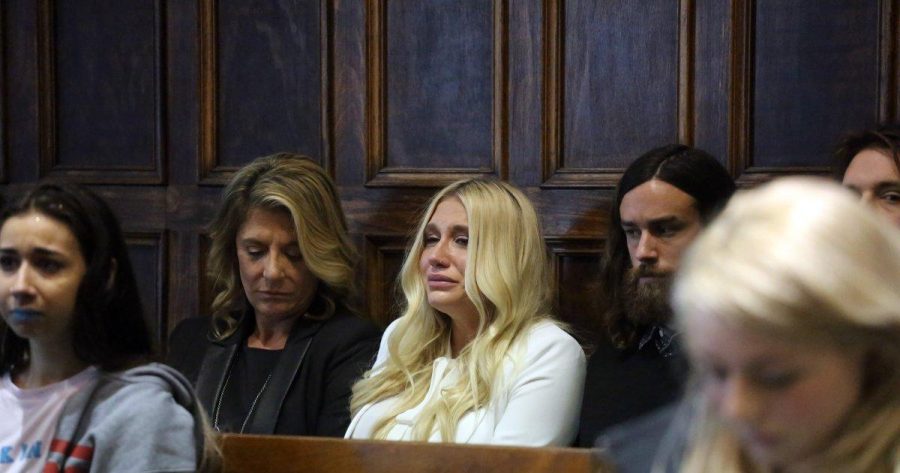Female musicians speak out about sexual assault
Kesha receives the news of her contract being upheld tearfully. This image quickly became iconic, representative of a watershed moment in the music industry where sexism came to light in a serious way.
May 17, 2016
Several female musicians, including Kesha, Amber Coffman, Larkin Grimm and Chelsea Wolfe, have alleged sexual misconduct against various publicists and record label heads in the space of a few, precedent-setting months.
Kesha’s famous, increasingly complex legal quagmire accusing producer Dr. Luke of rape and other abuse, initially started in late 2014, rages on. Among a litany of charges, she is also requesting to be released from her recording contract with Dr. Luke, full name Lukasz Gottswald, which would force her to record eight more full albums with him.
In a major blow to Kesha’s case, New York judge Shirley Kornreich dismissed in April all but one of Kesha’s charges, citing the lack of physical evidence surrounding her sexual assault claims and stating that “[Kesha is] asking the court to decimate a contract that was heavily negotiated and typical for the industry… my instinct is to do the commercially reasonable thing.”
Widespread fan protest and support from numerous celebrities, most notably from Taylor Swift, Miley Cyrus and Lena Dunham, continue to damage the reputation of both Sony and Dr. Luke as the lawsuit continues.
In Kesha’s wake, numerous other mostly independent musicians, have spoken out about their own experiences with sexual assault in the music industry.
Amber Coffman, of critically acclaimed indie rock band Dirty Projectors, first spoke out about publicist Heathcliff Berru on Jan. 19, alleging that he “rubbed [her] a**” and “bit [her] hair” at a bar.
Afterwards, a torrent of allegations from other musicians against Berru came forward. Bethany Cosentino, of Best Coast, corroborated Coffman’s claims, stating on Twitter, “Seriously, [Berru] is not a good person on any level.”
Acclaimed black metal artist Chelsea Wolfe further accused him on Twitter, stating, “He tried to kiss me after what I thought was a casual business meeting… sucks to know he was creeping on other women even harder.”
Yasmine Kittles, who performs experimental music as TEARIST, further alleged on Twitter that Berru forced her onto her couch and forced her to perform manual sex. Kittles also explained how she was silenced, stating, “I told our manager at the time [about the abuse] who said, ‘We are going to have to get over that aren’t we,’ if I cared about my band.”
Immediately, D’Angelo, Kelela, DIIV and Speedy Ortiz, among many others, dropped Berru as their publicist. Berru swiftly resigned and his company, Life or Death PR, was dissolved, all in the space of a few days. In many ways, it was a very immediate success story for the victims involved.
The accusations of Larkin Grimm are more ambiguous.
On Feb. 25, Larkin Grimm, an experimental folk musician, made a Facebook post accusing Michael Gira — head of her former record label Young God and frontman of famed, influential noise rock outfit Swans — of raping her in 2008.
“[Gira] dumped me from his label when I confronted him about it,” alleged Grimm. “Sending my love out to Kesha, I know how you feel.”
Grimm’s accusations were swiftly and strongly denied.
Gira maintained that he and Grimm had a consensual encounter, while his wife, Jennifer, purported to have “proof IN MY HAND that [Grimm’s accusations] are false.”
Grimm has since deleted her original accusations. The “proof” to which Jennifer Gira referred has yet to come forth. The incident has had little bearing on Michael Gira’s career or reputation, unlike in the case of Heathcliff Berru.
These allegations, regardless of their truth, set new precedents for women in music.
Prior accusations by women against men in music have not been heard or taken seriously with such vigor as they are now in 2016. For example, rap titan Dr. Dre’s violent 1991 assault against Dee Barnes, where he “smashed [her] face and body into the wall”, were ignored for years until a biopic about Dre and his rap group N.W.A., “Straight Outta Compton,” was released in 2014 and brought Dre under scrutiny for past abuses (Pitchfork).
During her legal battle, Kesha stated, “I got offered my freedom IF I were to lie. I would have to apologize publicly and say that I never got raped. THIS IS WHAT HAPPENS BEHIND CLOSED DOORS. I will not take back the truth.” Thankfully, it seems that no one will force her to do so.


